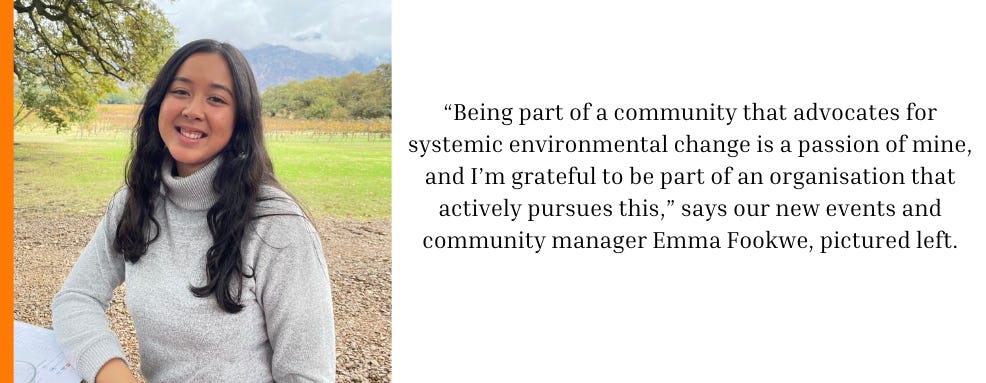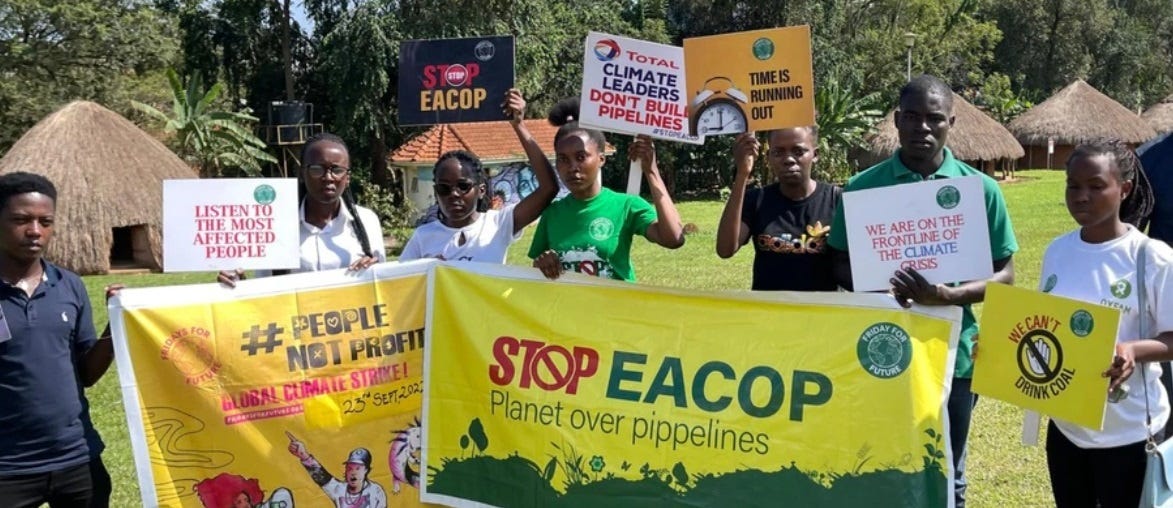We're growing!
A new larger team is allowing FFSA to get more done this year. Here's an introduction to some new faces and an general update, including how we're taking on TotalEnergies.
FFSA has grown dramatically this year. It’s an exciting time for us as our teams expand from eight to fourteen people, enabling us to push even harder on our mission: the redirection of finances away from the fossil fuel companies who are causing climate breakdown, into more humane and sustainable activities for the sake of all who live on our beautiful planet.
Here are two of our new team members. We’ll introduce more as time goes by.
Our joy is measured, of course: the reason for our growth is the unrelenting urgency for us to bring the fossil fuel industry under check even faster. As greenhouse gas emissions rise, people across the world are experiencing ever-more intense effects of the “climate crisis”, with record global temperatures for the past ten months in a row and a growing litany of news headlines about fires, floods and droughts.
We all have a stark choice: to accept that we’re careening into climate catastrophe willy-nilly or to take the most powerful action possible. FFSA remains convinced that by “going for the money” as journalists say, we can help to slash carbon emissions at their source by undercutting the financing and social license of the fossil fuel industry.
We’d love your support in any way possible. Joining an FFSA campaign would mean you’re joining an important movement for climate protection, and with it, the protection of human rights across the globe. Please consider regular donations if you can manage it.
It’s not a climate crisis, it’s a rogue industry crisis
Climate breakdown is not a natural phenomenon, it’s a crisis created by a rogue and unregulated fossil fuel industry. Is this statement too hard on oil, gas and coal companies? Not at all. They’ve been putting their own profits above the well-being of human beings and the planet for decades through blocking green technology, deceiving the public about climate change and their own emissions, which they continue to do, failing to invest consistently in cleaner energy sources and research, and abandoning their decarbonisation promises.
In June last year, the non-profit Carbon Disclosure Project (CDP) released a report finding that all of the world’s 100 biggest oil and gas companies have made “almost no progress” towards meeting the emissions reductions targets outlined in the Paris Agreement, which they claim to support.
This year, advocacy group Oil Change International produced new evidence that the world’s largest oil companies, including TotalEnergies (see story below), Shell and BP, are all neglecting their Paris Agreement emissions targets. These companies’ climate plans are incompatible with limiting global heating to 1.5C above pre-industrial levels, the level at which catastrophic consequences ensue, and the level we’re reaching fast. (The World Meteorological Association noted in January this year that we’d already reached 1.45C)
It’s high time to hold them to account on every front, and to push with all our might for change.
Fossil Ad Ban lodges greenwashing complaint against TotalEnergies
Our Fossil Ad Ban campaign has lodged our first greenwashing complaint with the Advertising Regulatory Board (ARB), against TotalEnergies.
The advert we’re contesting claims that TotalEnergies is “committed to sustainable development and environmental protection.” This is a false claim that clearly constitutes greenwashing, we’ve told the ARB.
Along with its failure to honour its Paris Agreement targets (see story above), TotalEnergies is shown in a report by French NGOs, revealed by Le Monde, to be linked to at least 23 “carbon bombs” – vast fossil fuel extraction sites that scientists say have the greatest carbon emissions potential over their life cycle. The company ranks second in the world for developing carbon bombs, behind the state-owned mining company China Energy and its 41 coal mines.
This, although the lead authors of the latest report by the Intergovernmental Panel on Climate Change state that fossil fuels – gas, coal and oil – must be phased our urgently and no new fossil fuel infrastructure should be developed anywhere in the world, to keep global heating to under 1.5C.
Our submission to the ARB notes that TotalEnergies “continues to explore for new oil and gas reserves across Africa.” The company has a 62% stake in the East African Crude Oil Pipeline project which, if built, would generate 34 million tons of carbon emissions every year. Five activist groups are taking the company to court for human rights violations.
TotalEnergies has recently been granted a licence for exploratory drilling between Cape Agulhus and Cape Town, for which activists are launching legal action to protect local communities and the environment.
Is TotalEnergies committed to environmental protection? Hardly. We await the ARB’s response.
Genocide in Gaza
The FFSA team has recently had serious internal discussions over whether taking a stand for Palestine – an issue on which we are now planning two events (more to follow) – would constitute “mission creep”. Given the considerations, there were few doubts. We’re convinced that climate activism groups should, indeed, stand up against the human rights and environmental violations committed by the Israeli government and its allies. We have long been part of the international Climate Action Network of climate activist NGOs, which has taken a clear stand on this issue.
Why do we join them? Though we are focused on the fossil fuel industry, we are at root a human rights campaign. The world’s inattention to the human rights of Palestinians all too closely echoes the way in which climate inequality privileges the rights of polluters while treating the lives of the most vulnerable as disposable, just as did apartheid in South Africa.
We don’t just wish to challenge fossil fuels – we want to challenge the “philosophy” they embody – that powerful institutions should be allowed the license to exploit, destroy and trample vulnerable populations.
What’s more, fossil fuel companies are literally fuelling the conflict between Israel and Palestine. Major oil companies are supplying the Israeli military, and experts [1, 2, 3, 4, 5] speculate that fossil gas reserves in Gaza may be contributing to the conflict, as Israel has ambitions to achieve energy independence and to facilitate the West’s efforts to diversify from Russian energy sources.
Despite international law prohibiting the exploitation of finite non-renewable resources in occupied territories, Israel announced it has awarded offshore natural gas exploration licences to six Israeli and international energy companies. These areas are considered to be Palestinian maritime areas under international law.
Militaries are responsible for emitting approximately 5.5% of global greenhouse gases annually, exceeding the combined emissions of the aviation and shipping industries. If the global military were a country, its carbon footprint would be the fourth largest worldwide, listed between India and Russia. Armed conflict pushes humanity even closer to climate catastrophe, and is a wasteful use of our shrinking carbon budget.
A recent study tentatively estimates that the carbon emissions generated by the Israeli military in the first 60 days of the war are greater than the annual carbon footprint of 20 of the world’s most climate-vulnerable nations. The eventual reconstruction of the destroyed Gazan infrastructure emerges as a significant source of probable future emissions, on par with New Zealand’s annual CO2 emissions and higher than 135 other territories.
We believe in a holistic approach to climate activism, and that questions of social justice and environmentalism are intertwined. This approach, called intersectional environmentalism, is defined by Leah Thomas as an “inclusive version of environmentalism that advocates for the protection of both people and planet”.
As citizens of a country that has suffered under apartheid, and that recently led the international legal challenge to the genocide, we have a responsibility and opportunity to bring lessons from our experiences to aid the Palestinian cause.
We’ve long encouraged divestment as a mechanism for advancing socially and environmentally ethical investments, and are exploring how that principle can be applied here, not least in respect of arms supplies to Israel.
This is a position that we realise may still be controversial for some. It’s been a journey for some of us too. We’re happy to engage in dialogue and unpack our thinking if you want to reach out via hello@fossilfreesa.org.za or by responding to this newsletter online.

Clean Creatives SA
Fifty-seven advertising and PR agencies in South Africa have now pledged to refuse work for fossil fuel companies by signing up to Clean Creatives South Africa (CCSA).
FFSA is hosting CCSA, the local chapter of the international Clean Creatives movement, and we’re chuffed to learn that South Africa has the fourth-highest number of sign-ups after the US, Canada and the UK. More than 1 000+ agencies worldwide have signed up, the global organisation announced on Earth Day last month. Read more about this exciting milestone on The Drum, PR Week, Business Green and more.
Said one of the local signatories, Sylvester Chauke of DNA Brand Architects:
Envisioning an industry armed with the superpower of conscience, we must challenge the status quo… In the face of escalating climate crises, continuing to bolster oil companies seems increasingly irrational. It is time for a change.
And another, Jo Eyre from Voxeon:
The Clean Creatives mission aligns perfectly with our view that communication can be a powerful force for good in the world.
Plentify's Jon Kornik pulled no punches:
Fossil fuel companies are destroying our planet. The creatives and PR agencies who work to greenwash them and spread misinformation are complicit in the destruction. Our decision to sign the pledge aligns with our dedication to forging a smarter, cleaner, and more sustainable energy future for all.
The global Clean Creatives F-List Awards 2024 was streamed on May 8th, featuring a special celebrity guest from South Africa, Kagiso “KG” Mokgadi.
Clean Creatives SA has been rocking and rolling. On 8 March this year, they held a webinar in collaboration with SHE Changes Climate for International Women’s Day called “Women for change: uniting business and climate leaders for a sustainable future,” and gave a talk at the MINI Big Love Stage at the Greenpop Reforest Fest, moderated by Jeremy Loops, on why the creative industry needs to cut ties with fossil fuels (spot CCSA director Stephen Horn with Loops in the pic below).

In brief
We’ve completed our second update of our Climate Reporting Guide for South African journalists.
Here’s a summary of our recent university engagements.
Till next time
We’ll be in touch again soon. Meanwhile, please remember that FFSA is a network of citizens concerned about climate breakdown, which we trust includes you, and we’d love to hear from you!
Email hello@fossilfreesa.org.za and we’ll get back to you.
Jo, David, Emma, Thameena and the FFSA team.









